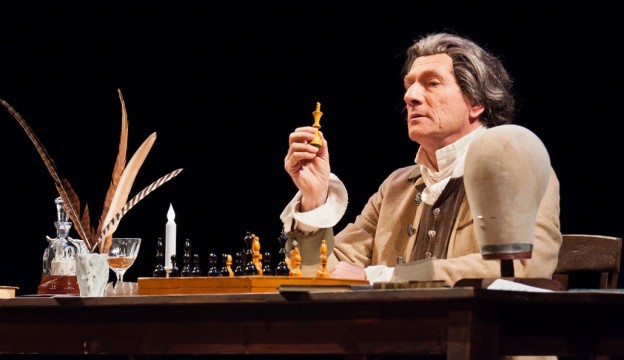This week on DirecTalk Radio: Actor and writer Ian Ruskin as Thomas Paine speaks with Joseph Miller.
Anglo-American actor IAN RUSKIN trained at Royal Academy of Dramatic Art and performed in England for 15 years. He came to Los Angeles in 1985 and worked primarily in television; usually guest starring as the intelligent bad guy in shows such as “Murder She Wrote”, “Scarecrow and Mrs. King” and “MacGyver”. This work paid the rent but did not in any way fulfill his dream as a student at RADA – to work in plays that would affect an audience. A pivotal moment arrived in 1994 while playing the lead in Rob Sullivan’s Strike Story: The Harry Bridges Story. A rehearsed reading before the ILWU, the renowned labor leader’s own union, was capped by a ten-minute standing ovation. Some years later Ruskin put his hand to writing and recording radio documentaries and one-man plays, including From Wharf Rats to Lords of the Docks, which was eventually directed and filmed for PBS by the legendary Academy Award-winning cameraman, the late Haskell Wexler.
In 2010 Ruskin received a COLA [City of Los Angeles] Fellowship to write To Begin the World Over Again: the Life of Thomas Paine, and has toured over 60 performances to date, including Harvard Law School, The American Philosophical Society, the ACLU, and the Royal Academy of Dramatic Arts. What’s more, a film adaptation (Wexler’s final project, before passing away at 92), narrated by Elliot Gould, is now complete and will be featured on PBS nationwide later this year. Ruskin brings his play to Santa Barbara on Saturday afternoon February 13 for one performance at the Faulkner Gallery at the Central Public Library. The performance is free, and hosted by The Institute of World Culture.


This is a wonderful addition to the body of inspirational ideas shared through the arts. Thank you!
I had the great pleasure of being present for Ian Ruskin’s portrayal of Thomas Paine in Philadelphia a few years ago, at the American Philosophical Society. He was sensational in the role and there received a standing ovation. What is most exciting to me, as a long-time member of the organization Thomas Paine Friends (and, now, serving a second term as President of our organization), Mr. Ruskin has brought forward Paine’s most progressive and intriguing ideas on what is required to achieve just societies. This material comes, in part, from Paine’s tract, “Agrarian Justice.”
Mr. Dodson,
Thank you so much for taking a moment to post. Even those of us who have heard of “Common Sense” and “The Age of Reason” know little about “Agrarian Justice”. I’m sure that if Paine’s ideas on social justice attract the attention of Paine experts like yourself, then the rest of us ought to bend our ear. And I’m so glad Mr. Ruskin has found a way to use his talents to do just that.
I am only one of the more recent persons to come to realize the unique greatness of Thomas Paine. As a young college student I read Rights of Man and The Age of Reason. Some years afterward I was introduced to the writings of a man I consider to be Paine’s successor as a leading voice for liberty and equality of opportunity — Henry George. The principles they embraced I describe by the term cooperative individualism. I trust that Paine and George would nod in agreement.